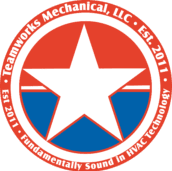Boiler Water Treatment & System Cleanliness
A boiler is a vital component in many industries, providing essential heat and power for various processes. To maintain its efficiency, longevity and overall performance, proper boiler water treatment and system cleanliness are paramount with professional boiler maintenance for optimal results.
Understanding Boiler Water Treatment
In this blog post, Teamworks Mechanical explains the significance of boiler water treatment and system cleanliness, understanding their importance, benefits, and best practices.
Boiler water treatment refers to the process of conditioning and purifying the water used within a boiler system to prevent corrosion, scale formation, and other detrimental effects. When water is heated in a boiler, impurities like dissolved minerals, salts, and gases can concentrate and lead to numerous issues that adversely impact the boiler's efficiency and safety.
Corrosion Control
Corrosion is a primary concern for boiler systems, as it can lead to equipment failure, leaks, and even catastrophic accidents. Proper water treatment involves the addition of chemicals like oxygen scavengers and corrosion inhibitors, which create a protective layer on metal surfaces and prevent corrosion.
Scale Prevention
Scale deposits can form on heat transfer surfaces due to the precipitation of minerals present in water. These deposits act as insulators and reduce heat transfer efficiency, forcing the boiler to consume more energy to achieve the desired temperature. Water treatment processes, such as water softening and descaling, help prevent scale formation and maintain optimal heat transfer efficiency.
Controlling Microbiological Growth
Microbiological growth, such as bacteria and algae, can flourish in untreated boiler water, forming biofilms that obstruct heat transfer surfaces and promote corrosion. Water treatment chemicals like biocides help control microbial growth and maintain system cleanliness.
Importance of System Cleanliness
While water treatment is essential, maintaining system cleanliness is equally crucial for the smooth operation of a boiler system.
Heat Transfer Efficiency
Clean heat transfer surfaces ensure efficient heat exchange, reducing energy consumption and operating costs. A fouled heat exchanger, on the other hand, will demand more energy to deliver the same output, leading to increased fuel consumption and decreased efficiency.
Reducing Maintenance Costs
A clean boiler system with proper condensate management requires less maintenance and repairs. By preventing scale and corrosion, the frequency of maintenance shutdowns is reduced, resulting in cost savings and increased productivity.
Extending Equipment Lifespan
Regular cleaning and proper water treatment can significantly extend the lifespan of the boiler and its components. This not only saves capital expenses but also ensures continuous and reliable operation.
Best Practices for Boiler Water Treatment and System Cleanliness
1. Regular Water Analysis: Conducting routine water analysis helps identify any changes in water quality and detect potential issues before they escalate. Parameters like pH, alkalinity, dissolved oxygen, and conductivity should be monitored regularly.
2. Choosing the Right Water Treatment: Chemicals Selecting suitable water treatment chemicals tailored to the specific boiler system and water quality is crucial. Consulting with water treatment experts can help determine the most effective chemicals and dosages.
3. Mechanical Cleaning: In addition to chemical treatments, mechanical cleaning methods, such as brushing, sandblasting, and acid cleaning, can be employed to remove stubborn scale and deposits.
4. Regular Inspections: Frequent inspections of the boiler system, including heat exchangers, pipes, and valves, can help identify potential issues early on and take corrective actions promptly.
5. Training & Education: Ensuring that personnel responsible for operating and maintaining the boiler system receive proper training and education on water treatment and cleanliness best practices is essential for successful implementation.
In conclusion, boiler water treatment and system cleanliness are integral to ensuring the efficiency, reliability and safety of industrial boiler systems. Proper water treatment and regular cleaning not only enhance performance and reduce operating costs but also extend the lifespan of the equipment, leading to a more sustainable and productive operation.
Investing in water treatment and cleanliness is a wise decision that pays dividends in the form of a well-functioning and dependable boiler system.




















